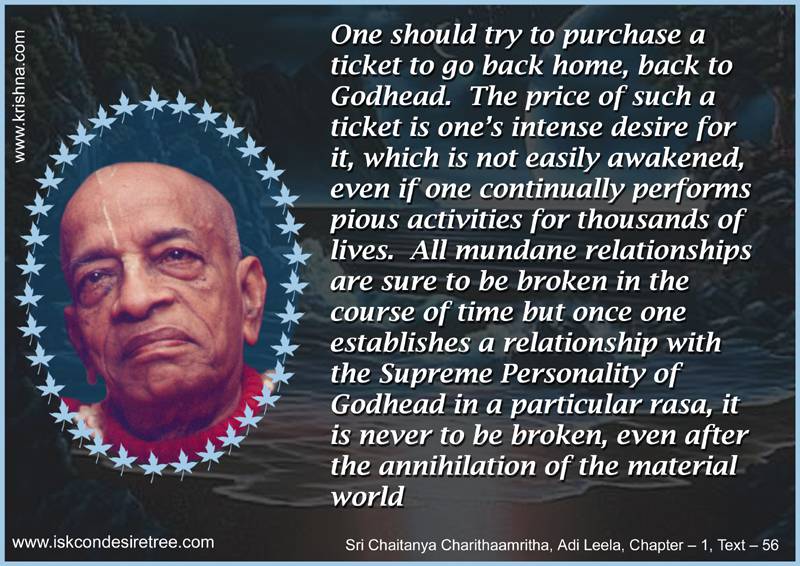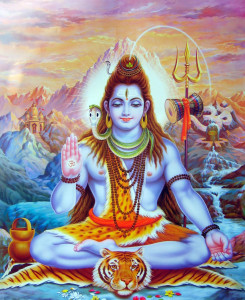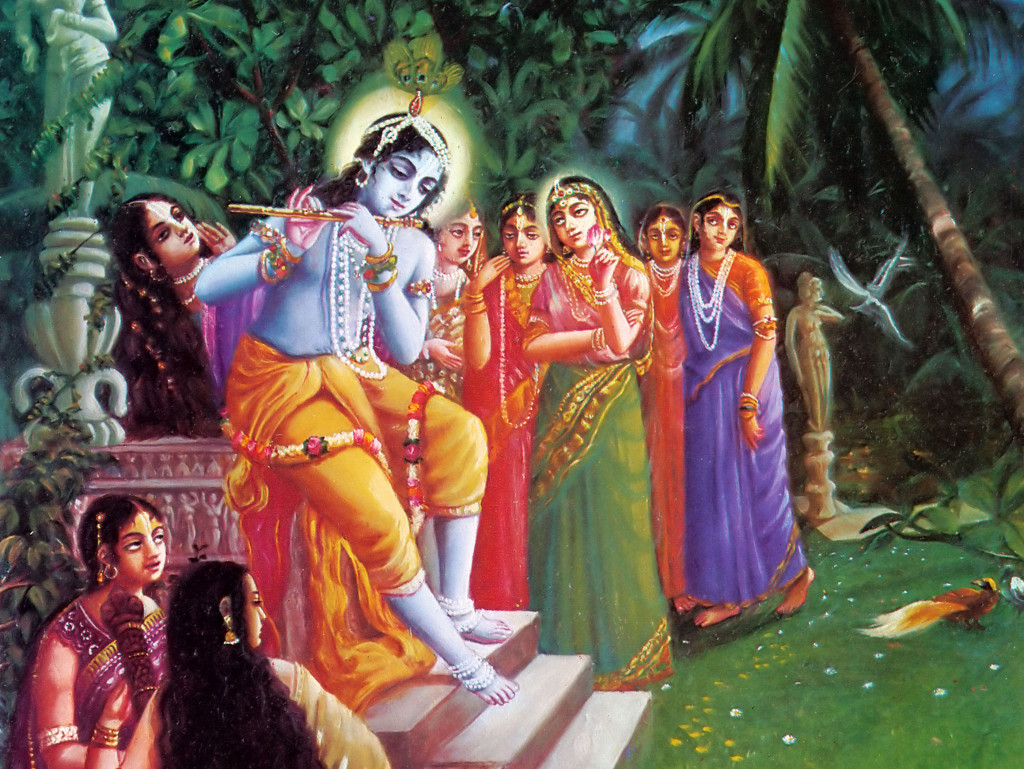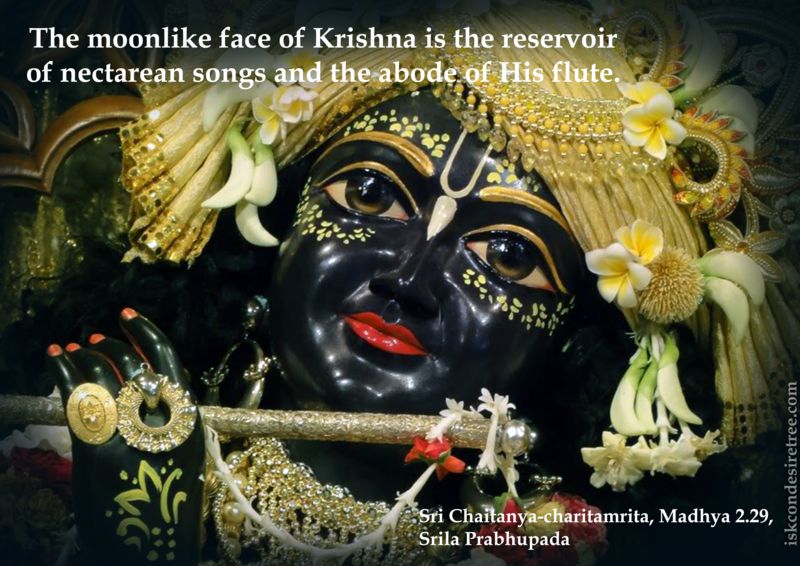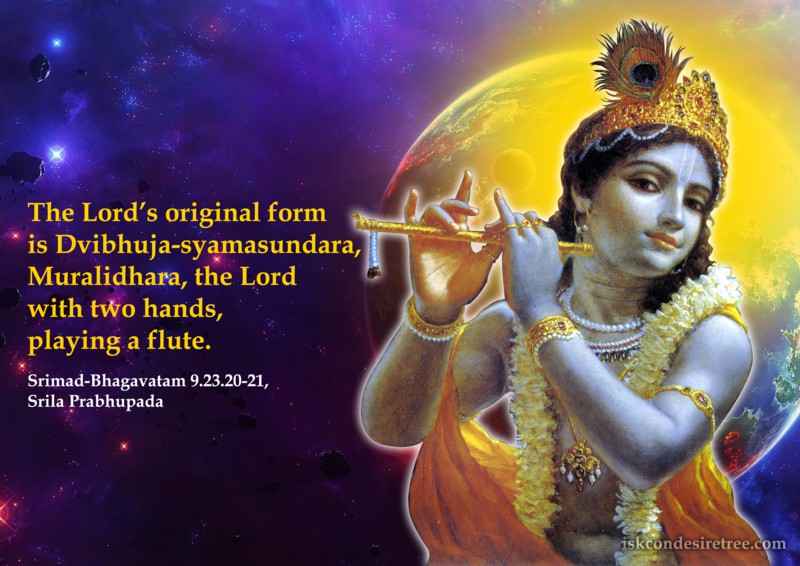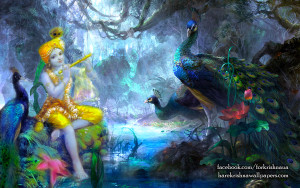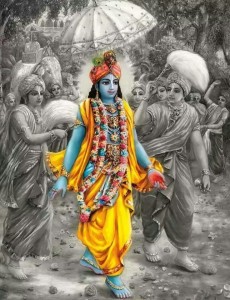Hare Krishna.
8th January, 2015, Gurgaon.
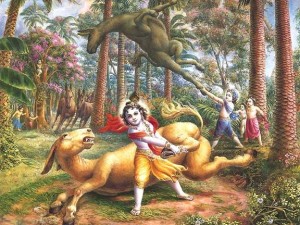
I got up early today but felt too cold and lazy to get up from the bed, freshen up and start Chanting. I picked up my phone and looked for something to read for a while. Fortunately, I found a very sweet seminar given by HH Bhakti Charu Swami Maharaj on the demons in Krishna’s pastimes and various anarthas' they represent. I had onlypart II’ of the seminar hence please pardon me if I miss out some details.
Maharaj explained that all these demons and the anarthas they represent are described in `Krishna Samhita’, a very interesting book by Srila Bhaktivinoda Thakura.
I am now briefly mentioning all the demons and what they represent in a concise way below. I have taken some information from a VIHE book called `demons in Vrindavana Lila’ and some pastimes I am writing in a little more detailed manner as maharaj described them.
BCS: The word Nanda is coming from ananda. What is ananda? Joy. So Nanda Mahārāja is joy personified. Joy personified tends Krishna.
Yaśodā. Yaś means? Fame, And dā means? Giver. Yaśodā, mother Yaśodā is the giver of fame.
So different personalities have been identified in this way.
What is Kaṁsa’s business? His whole purpose is to kill Kṛṣṇa. Now who wants to kill God? Atheism. Atheism wants to kill God. Kaṁsa is actually atheism personified.
1. Putana (the witch) – the pseudo guru.
We all know how Putana came into the village where the baby Lord Krishna lived and assumed a beautiful form and then tried to kill Him by offering her breast milk to Him after she had put poison on her breast. But Krishna sucked the life air out of her and killed her. Nonetheless, Krishna had accepted her like a mother and she attained liberation.
Putana represents the pseudo-guru. The pseudo-guru may appear in one or both of two forms:
A. A deceitful, so-called guru who preaches sense gratification or liberation or both.
B. The inwardly manifest “spiritual” guide, in the form of the mundane empiric reasoning faculty (the material mind).
2. Sakatasura (the cart demon) – carrying the burden of a cart-load of old and new bad habits, Not understanding the purpose of religious principles. He also represents lethargy, dullness and false pride. Krishna removes this contamination by kicking it aside.
BCS: Śakata means a cart, a bullock cart. Those days they used to carry things not in tractors or trucks and such vehicles. The mode of transportation was carts drawn by bullocks. So there was a śakaṭā and they used to keep all things on that cart and then they used to harness it with a bull or bulls. So it was an occasion when Krishna was just turning to His side, which means about three months. At three months or so the baby learns to turn to his side. So that is the occasion to celebrate. They were celebrating this occasion and when Mother Yaśodā was making all the arrangements. She thought that she would keep Krishna under this cart. This kind of protected somehow. But a demon actually came and wanted to kill Krishna. The idea actually was that Pūtanā assumed a form and therefore Krishna could kill her. So this one decided not to take any form. But just go there and make the cart to collapse. And then he would put his pressure and strength on Krishna to kill Him. Krishna knew what was going on. So Krishna was lying there and what He did, He just touched the cart with His baby foot, maybe just with the toe. And the cart immediately collapsed. And all these heavy articles were there and they just got scattered. An anxious mother Yashoda rushed out and found that although the cart collapsed, all the articles were scattered and fell but the baby Krishna was not harmed.
3. Trinavarta (the whirlwind demon) – false pride which coming from dry or material logic, which leads to bogus philosophies.
Trnavarta represents the false pride produced by useless scholarship, which gives rise to wrangling debates and arguments, dry reasoning and dry logical indulgences in the association of people who are attached to such things. It produces controversy which is disloyal to the path of pure bhakti, such as Mayavada and Buddhism. It is the breeding place of demoniac, sinful philosophies.
Lord Krsna becomes moved by the humility of His devotees, who carefully avoid this fault, and He strangles the demon and removes the thorn from His devotees’ endeavours in devotional service.
This demon took the shape of a vast whirlwind and lifted Lord Krishna way up into the sky in order to try to kill Him. But Lord Krishna became so heavy that He brought down the demon so hard that Trinavarta was killed.
4. Deliverance of Nalakuvara and Manigriva (breaking the twin arjuna trees) – Arrogant pride which comes from puffed-up prestige, which is rooted in a madness for wealth.
It gives rise to cruelty to animals, lust for women, and indulgence in alcohol. These further give rise to debauchery of the tongue — uncontrolled eating habits and loose talking. Then come general hard-heartedness, shamelessness and all sorts of disgraceful activities.
Krishna very mercifully breaks down the twin Arjuna trees while tied to the grinding mortar in order to destroy all these faults.
This pastime of Krishna very directly illustrates the predicament of people who are wealthy and aristocratic, but who become involved in licentiousness. It is interesting to note the remedy applied by Narada Muni — poverty, or in terms which are particularly relevant to ourselves as aspiring devotees, simple living and high thinking.
5. Vatsasura (the calf demon) – a childish type of mentality which gives rise to a type of greediness which results in a wicked type of mischievousness.
It gives rise to a type of greediness for sense gratification through which one becomes absorbed in materialism.
BCS: So Krishna is just about six years old, five, going on six. And at that time the children in the cowherd community were given the charge of the calves. Like apprentice, they were apprentices. They have to go out to take care of the cows, but as children they can take care of the children of the cows. So Krishna was given charge with Balarāma to take care of the calves and with the friends they used to go to the forest. So once they went to the forest and here came this demon, Vatsāsura, disguised as a calf. In the middle of so many calves, this calf was there, which was actually a demon and his intention was to kill Kṛṣṇa and Balarāma. So Krishna identified that demon. And He told Balarāma: “Balarāma, this character looks strange, you can’t trust him, he is not our regular calves. … So who is this character? Balarāma asked: “Will You take care of him? Or should I take care of him?” Krishna said: “Let Me take care of Him.” And then at one point this calf just came and charged towards Krishna, it tried to kill Him. And Krishna just grabbed the calf with his legs and started to swing him, swing him, swing him… This is Krishna’s favorite way of killing the demons, especially when they come in the form of some animal. And then He threw the calf onto the space, it was already dead and it fell in the forest of kapittha trees.
6. Bakasura (stork demon) – False religiosity. He represents cunning duplicity, deceptive behaviour and hypocrisy, the outward manifestations of a false lifestyle of cheating activities.
BCS: Bakāsura came in the form of a crane. The crane is a bird that looks like a swan. A crane looks somewhat like a swan but the characteristics are completely different. The swan lives in a very quiet, serene atmosphere. This bird also lives in a watery atmosphere. And what does it do? It stands at one place as if it is meditating. And that also with one leg drawn up. How many of you have seen a crane? So you have seen how this crane stands in the water on one leg. Like sometimes the yogīs stand on one leg meditating. But what does the crane meditate on? It meditates on fish. It is just watching, meditating on the fish. And the moment it sees a fish it just catches it. This demon came assuming a form of a crane, a huge crane. So they all were playing and they saw this beautiful, huge bird. They all out of curiosity came there. Bakāsura was just waiting, while they were all marveling at the sight of this huge bird, this bird just swallowed up Krishna. And the bird what did it do? It just expanded himself but Krishna expanded Himself the bird could not swallow Him. And Krishna became so hot that it could not keep Krishna in his mouth, it threw out Krishna from his mouth. And then Krishna just stood there but this bird again came to swallow Krishna. But this time what did Krishna do? Krishna with his foot pressed his lower jaw and with His hand Krishna pressed his upper jaw. And then Krishna just pulled and its body tore into two pieces. The demon was dead.
7. Aghasura (the snake demon) – Aghāsura is cruelty personified. Aghasura represents the mentality of cruelty to others, and violence and causing trouble to others out of envy. This attitude is an offense against the chanting of the holy names. It may also manifest in the form of an unwillingness to help other living beings by giving them Krishna consciousness.
The demon Aghasura was the younger brother of Putana and Bakasura. He assumed the form of a great python, expanded to the length of eight miles and grew as high as a mountain. He lay on the road with his mouth wide open, and Krishna’s friends playfully entered into the demon, being curious about the giant form and feeling confident in Krishna’s protection. Finally, Krishna also entered into the mouth of the demon in order to protect His friends, and then expanded His own body to such an extent that the demon suffocated and died, and then brought all of His friends back to life and out of the demon.
8. Brahma-vimohana Pastime (Lord Brahma steals the cowherd boys and calves) – mundane activities and speculative scholasticism.
The pastime of the bewilderment of Lord Brahma and his subsequent purification frees us from the cultivation of fruitive activities (karma) and speculative knowledge (jnana). It also rectifies the offense of disrespecting the Lord’s madhurya feature in favour of His aisvarya feature.
9. Dhenukasura (the ass demon) – Ignorance of knowledge of the soul through gross materialistic intelligence, or jackass-like foolishness.
BCS: This Dhenukāsura is a very beautiful pastime which happened after Krishna saved the cowherd boys from the devastating forest fire. Later, all the cowherd boys were feeling very, very hungry. They said: “Krishna we are feeling very, very hungry.” Then somebody says: “I am smelling some beautiful fragrance of ripe tāla fruit. How many of you have seen tāla fruits? Tāla fruits have a very sweet flavor. It’s a big purple fruit like this, it grows about this big and it has a very sweet flavor. But somebody said: “No,no don’t go there, that tāla forest is guarded by a demon called Dhenukāsura. And because of fear of him, nobody goes near. Because if you go there, then he will eat you up, Dhenukāsura. Balarāma said: “What? Who cares about this Dhenuka, the demon? Come let’s go. We are hungry!” Balarāma grabbed that tāla tree and started to shake it. And all the tāla fruits started to fall with a thud, big fruits falling with a sound. And Dhenukāsura woke up: “Who dares to come to my forest?” Who dares to enter into my territory? I will take care of them. And unconcerned about Dhenukāsura or whatever, Balarāma kept on shaking and the tāla fruits kept on falling one after another. And the boys, exited, started to pick them up and eat them. In the mean time Dhenukāsura came and he attacked Balarāma. How do the donkeys attack? Yes, their strength is in the hind legs. Do you know what the donkeys are famous for? First of all the donkeys are famous for their stupidity. Because the donkey needs just some grass and there is plenty of grass everywhere. But because he is a donkey he thinks that he has to work for his master and he carries this big burden everywhere, food to eat. And the donkeys are famous for carrying huge loads; they can carry huge loads, five, six times the weight of their body, the donkeys can carry. But in return … what does the donkey get? A little grass. But the donkey thinks that unless he carries this big load he won’t get any grass to eat.
Another thing, the donkey carries a big burden. And what is that burden? This burden is unnecessary materialistic karma, materialistic activities. We can so easily get rid of our karmic reactions, just by surrendering to Kṛṣṇa. When you surrender to Kṛṣṇa, will you have any karma left? Ahaṁ tvāṁ sarva-pāpebhyo mokṣayiṣyāmi mā śucaḥ… Krishna is giving us our assurance but our donkey propensity does not allow us to do that.
Another thing about this donkey demon. What is he doing? He is protecting this tāla fruit, the fruits of his activities, which are actually meant to be offered to Kṛṣṇa. But instead we are saying nobody should come and take it. All our possessions, we are guarding, saying: “Don’t come, don’t try to take my propenstity.” Are these the propensities of a donkey demon, Dhenukāsura? And this demon is killed by Balarāma. Who is Balarāma? Balarāma is the original spiritual master. This demon is killed by the spiritual master. Our donkey propensities are destroyed by the bonafide spiritual master. He teaches us about the importance of surrendering to Kṛṣṇa and becoming free from the unnecessary burden of our karmic reactions. Balarāma, the original spiritual master teaches us that there is no need to unnecessary carry the big burden of our materialistic responsibilities. And there is no need to carry the fruits of our activities, our possessions for our own enjoyment, offer it to Kṛṣṇa. This is how Dhenukāsura or the donkey demon is killed by Balarāma.
10. Kaliya (chastising the Kaliya serpent) – brutal cruelty, maliciousness, pride, envy and a snake-like crookedness.
He particularly tries to pour his poison into the hearts of innocent Vaisnavas, which Krsna cannot tolerate, so then the Lord kills him.
11. Extinguishing the Forest Fire – The first forest fire represents hatred and arguments between Vaisnavas or different religions, and disrespecting each other’s Deities. It can also represent any type of clash or conflict.
12. Pralambasura (killing the Pralamba demon) – lust for the opposite sex, and the desire for profit, adoration and distinction.
BCS: This Pralambāsura came in the disguise of a cowherd boy. And they were playing that one set of boys will carry in the game, they will carry the other set of boys. So Pralambāsura chose to take Balarāma. He disguised himself as a cowherd boy and he sided with Krishna’s team. There were two teams, Krishna’s team and Balarāma’s team. And he decided to carry Balarāma and he thought that he will kidnap Balarāma and if Balarāma can be killed then Krishna will die due to His intense separation from Balarāma. So He decided to kill Balarāma. Because all the demons are being killed one after another by Krishna. So they thought: “Okay, let’s not try to deal with Krishna but indirectly we will get rid of Krishna by stealing Balarāma. So Pralambāsura carried Balarāma and as he got Balarāma on his back he just ran and then while he was running, he assumed his demoniac form. From a little cowherd boy he became a huge demon. At first Balarāma got a little worried: ” Hey, what’s happening?” So Krishna reminded him :”Hey, You are Balarāma, don’t forget Who You are!” So then Balarāma got back to His senses and Balarāma hit him on the head and Pralambāsura was dead.
This Pralambāsura is impersonalism. This is impersonalism also is killed by Balarāma, the original spiritual master.
13. Second Forest Fire – The second forest fire represents the attack of atheism and other antagonistic philosophies on Krishna consciousness.
Srila Sanatana Goswami says that some people say that the forest fire was a friend of Pralambasura’s.
14. Brahmanas Performing Sacrifice -This pastime illustrates the fault of indifference towards Krishna arising out of pride due to high birth in the varnasrama system.
15. Overcoming the Pride of Indra – demigod worship, and the tendency to think “I am Supreme.” This pastime illustrates the mistake of thinking that it is good to perform demigod worship.
16. Nanda Maharaja Captured by Varuna – thinking that spiritual life can be enhanced by intoxication.
17. Nanda Maharaja Swallowed by Vidyadhara (the snake) – how Krishna saves the truth of devotional service from being swallowed by the Mayavadis and other atheists. It illustrates how devotees must avoid the company of such snake-like people.
18. Sankhacuda (killing the conch-shell demon and getting the jewel that was stolen by him) – proneness toward acquiring name and fame, and desire for sensuous enjoyment, under the plea of devotion.
19. Aristasura (the bull demon) – pride arising from indulging in false religions invented by cheaters which causes neglect of devotional service (bhakti). Due to their contaminated condition they show disrespect to the process of pure devotional service to Krishna.
This demon assumed the form of a huge bull with sharp horns in its attempt to kill Krishna and Balarama. When the bull approached the village, everyone was afraid. When the bull charged toward Lord Krishna, He grabbed him by the horns and threw him away. But the bull still wanted to attack. So Krishna threw him to the ground and thrashed him like a pile of wet clothing, which forced the demon to give up his life.
20. Kesi (the horse demon) – I am a great devotee and spiritual master, Kesi is pride personified.” Also the false ego arising from attachment from wealth and material accomplishments.
BCS : Then Kesi, as you know, went in the form of a huge horse, a gigantic horse. He was blowing out a fire from his mouth. From his mouth, from his nostrils the fire was coming out, such a terrible demon. And the cowherd boys were so much in anxiety, so upset.. But Krishna said:”Don’t worry, I will deal with him.” So Krishna just stood there, tying up his utariya, tying up his waist. When Kesi came. Kesi came to swallow Krishna up. This huge demon just wanted to swallow Krishna up. But what did Krishna do? Krishna stretched His left hand. And that hand went into Kesi’s mouth. But Krishna’s hand expanded to such a degree that Kesi’s throat got choked. And then this hand started to emanate fire, it became so hot. Kesi was dying. Kesi wanted to get the hand out of his mouth but he could not. Then Krishna grabbed him by his hind legs and started to swing him overhead. And as a result of that Kesi left his body.
21. Vyomasura (the demon in the sky) – associating with thieves and other rascals, and with people who put themselves forward as avataras, as well as cheating impostors who disguise themselves as devotees
Maharaj said we also have to deal with all these demons that are within our hearts and if we take shelter of Krishna then Krishna Himself will take of care of these anarthas within us !!
Bhaktivinoda Thakura says: “The devotee who worships the holy name should first petition the Lord for the strength to cast out all these unfavourable tendencies — and should pray thus before Lord Hari on a daily basis. By doing this regularly, the devotee’s heart will eventually become purified. Sri Krishna has killed a number of demons which may arise in the kingdom of the heart — so in order to destroy these problems, a devotee must cry very humbly before the Lord and admit defeat — then the Lord will nullify all contaminations.”
May we all take shelter of Lord Hari, daily cry for His help and tide over these obstacles in our bhakti soon.
All glories to the wonderful pastimes of Lord Krishna.
All glories to Sri Guru and Gauranga.
All glories to Srila Prabhupada.
Like this:
Like Loading...

